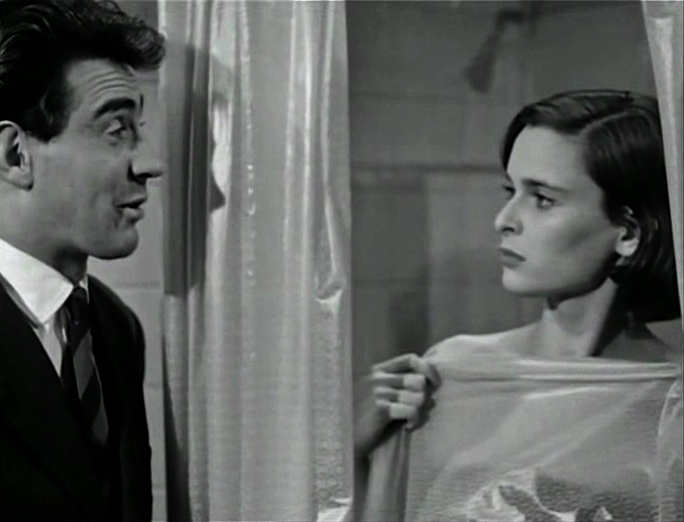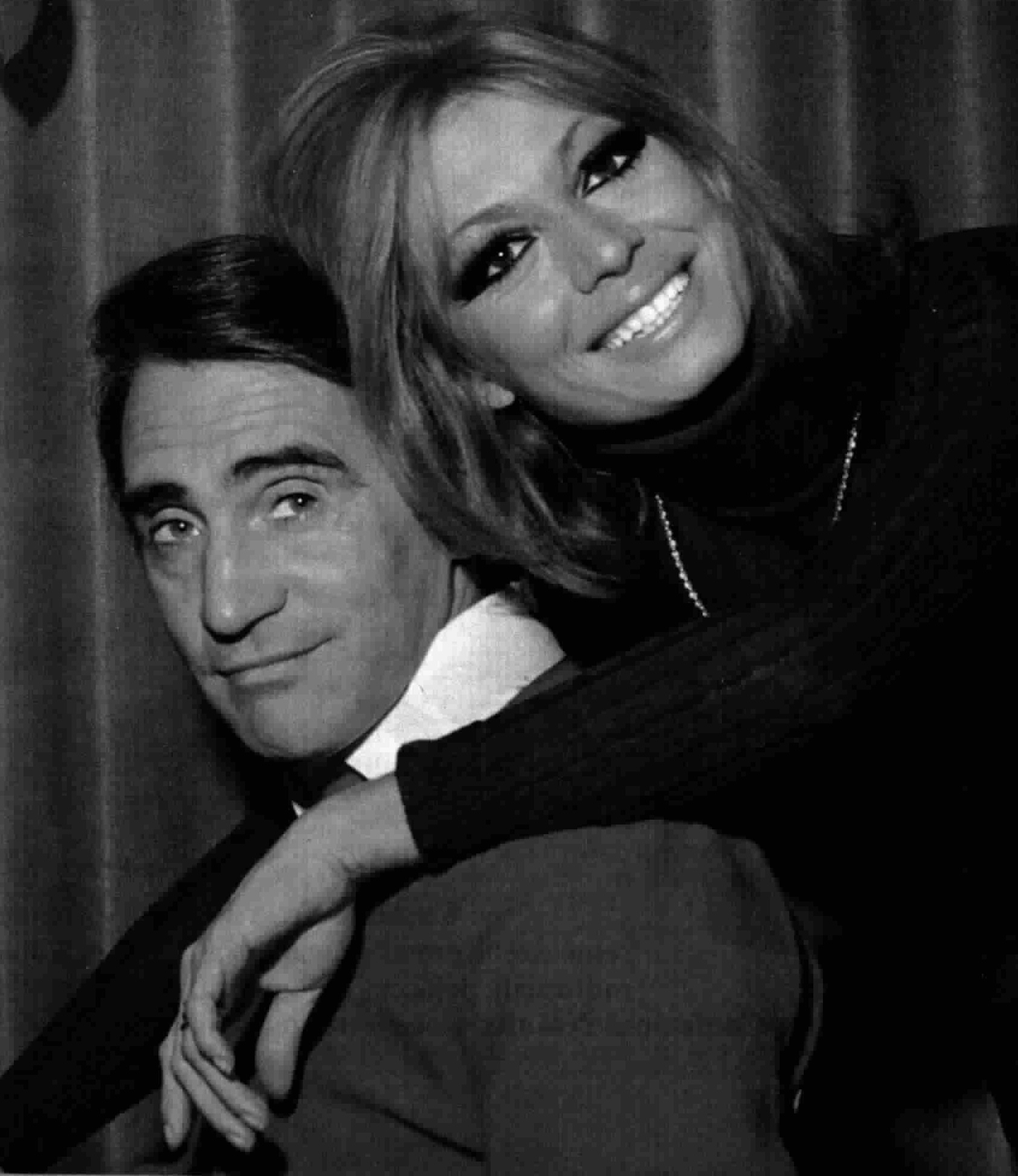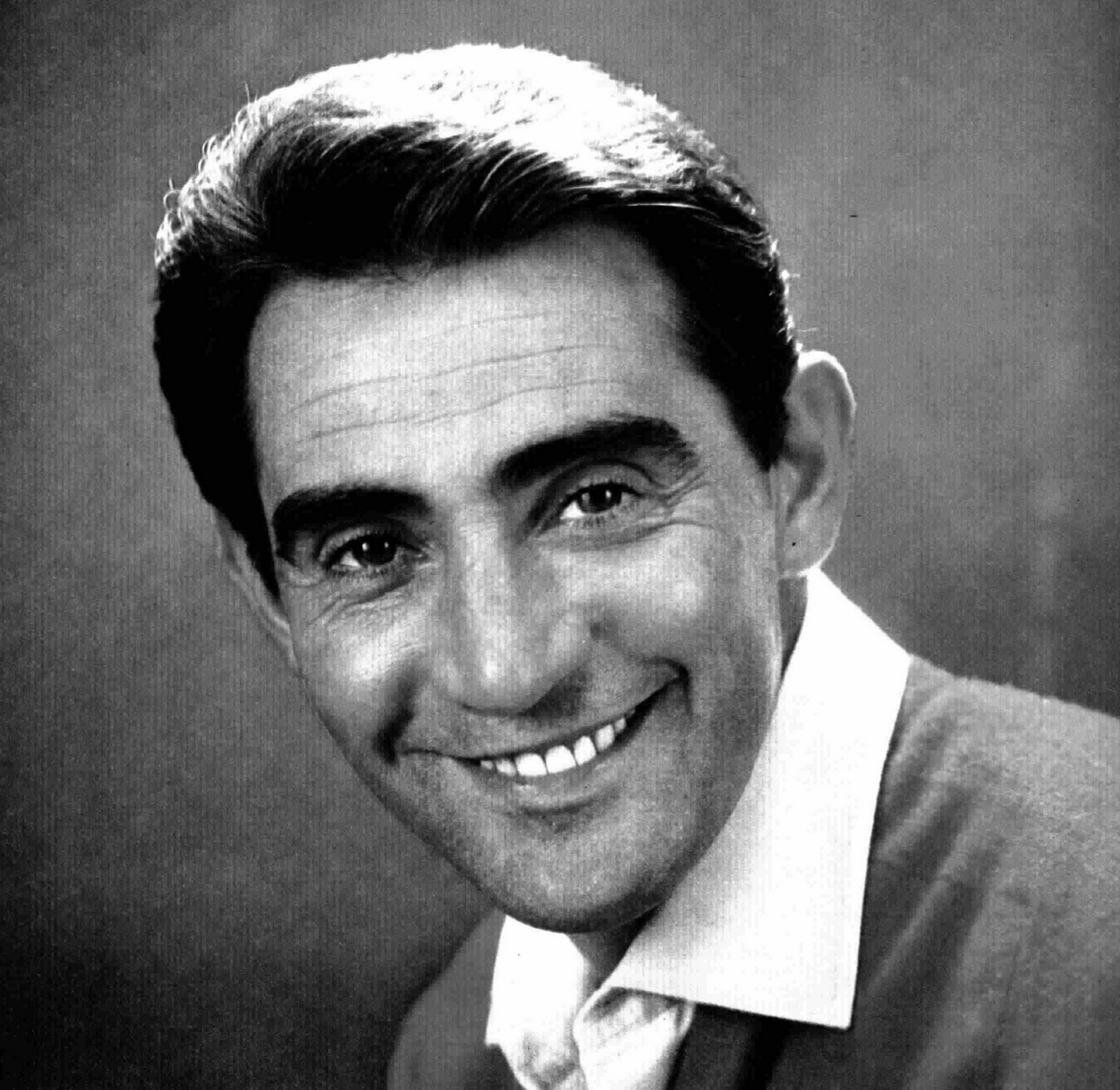1. Early Life and Military Service
Walter Chiari's early life was shaped by his family background and his experiences serving in World War II, which included a brief but impactful period as a prisoner of war.
1.1. Birth and Family Background
Walter Annicchiarico was born on March 8, 1924, in Verona, Italy. His family originated from the Apulia region of Italy. His full birth name was Walter Michele Armando Annicchiarico.
1.2. World War II Service
During World War II, Chiari initially joined the Decima Flottiglia MAS, a commando frogman unit of the Royal Italian Navy. He was subsequently drafted into the Wehrmacht, the armed forces of Nazi Germany, a detail that only became publicly known after his death. He was assigned to a German anti-aircraft squad operating in Normandy, Northern France. During the intense fighting of D-Day, Chiari was slightly wounded. Following his injury, he was captured by Allied forces and held at the American prisoner camp in Coltano.
2. Acting Career
Chiari's acting career was extensive, encompassing significant work in film, theatre, and musical comedy, establishing him as a versatile performer in Italian entertainment.
2.1. Early Career and Debut
Chiari began his professional journey in theatre before making his mark in cinema. His early stage performances laid the groundwork for his later success, allowing him to hone his comedic timing and dramatic skills. His screen debut was in the 1947 film Vanity, directed by Giorgio Pàstina.
2.2. Film Appearances
Walter Chiari appeared in numerous films throughout his career, often collaborating with notable directors and starring alongside prominent actors. In 1951, he was cast by acclaimed director Luchino Visconti in the film Bellissima, where he played the role of Alberto Annovazzi, a young lover. He also featured opposite legendary actress Anna Magnani in the same film.

His filmography includes international productions and collaborations. He appeared in The Little Hut (1957), a film where he met Ava Gardner, and Bonjour Tristesse (1958), directed by Otto Preminger. Chiari also worked with the renowned director Orson Welles in Falstaff (1965), portraying Mr. Silence. In 1966, he starred as Nino Culotta in They're a Weird Mob, the final film by the acclaimed British filmmaking duo Powell and Pressburger, based on a popular Australian novel by John O'Grady. He further expanded his international presence with another Australian film, Squeeze a Flower, in 1970. One of his later significant roles was in The Valachi Papers (1972), an Italian-American crime film directed by Terence Young, where he played the character Gap. Other notable film appearances include Toto Tours Italy (1948), The Elusive Twelve (1950), The Cadets of Gascony (1950), That Ghost of My Husband (1950), O.K. Nerone (1951), Sardinian Vendetta (1952), The Dream of Zorro (1952), A Day in Court (1954), Donatella (1956), The Sucker (1965), and Romance (1986). His final film role was in Tracce di vita amorosa (1990).
2.3. Theatre and Musical Comedy
Beyond his film work, Chiari maintained a significant presence in theatre, particularly in the realm of musical comedy and prose plays. He was a prominent figure in musical comedies produced by Garinei and Giovannini, starring in productions such as Buonanotte Bettina in 1956 alongside Delia Scala, Il gufo e la gattina in 1958, and Un mandarino per Teo in 1960, which also featured Sandra Mondaini, Ave Ninchi, and Alberto Bonucci.
His versatility extended to prose theatre, where he performed in The Gay Life in 1961. In 1965, he appeared with Gianrico Tedeschi in Luv, a comedy by Murray Schisgal. The following year, in 1966, he starred with Renato Rascel in La strana coppia, the Italian adaptation of Neil Simon's famous play.
3. Personal Life
Walter Chiari's personal life involved several high-profile relationships, including a marriage and a son, which often drew public attention.
3.1. Relationships and Family
During the production of the 1957 film The Little Hut, Walter Chiari met American superstar Ava Gardner. At the time, Gardner was still married to Frank Sinatra but was estranged from him, and Chiari began a relationship with her.

Later, he became involved with Italian singer and actress Alida Chelli, who also appeared with him in the 1966 film They're a Weird Mob. Chiari and Chelli married in 1969. They had one son together, Simone Annicchiarico, who later became a television presenter. Their marriage concluded in divorce in 1972.
4. Legal Troubles and Career Impact
A significant turning point in Walter Chiari's career and public image was his arrest on drug-related charges, which had lasting negative consequences for his professional life.
4.1. Drug Arrest and Subsequent Career Decline
In 1970, Walter Chiari was arrested and jailed in Rome on suspicion of cocaine possession and trafficking. The legal proceedings that followed had a profound and detrimental impact on his career. After his release, he faced a partial acquittal: he was found not guilty of the trafficking charge but received a lenient sentence for drug possession for personal use. Despite the partial acquittal, his career never fully recovered its former prominence. The Italian state television network effectively blacklisted him, making it impossible for him to secure major roles. Consequently, he was largely limited to minor parts in low-key comedies and appearances on local television and in theatre productions.
5. Death
Walter Chiari's life concluded in Milan in the early 1990s.
5.1. Final Years and Passing

Walter Chiari died of a sudden heart attack at his home in Milan on December 21, 1991. His body was laid to rest in the Civico Mausoleo Palanti within the Cimitero Monumentale di Milano. His gravestone bears an epitaph he once shared with director Dino Risi as his preferred choice: "Don't worry, I'm merely catching up with sleep."
6. Legacy and Critical Reception
Walter Chiari left a complex legacy in Italian entertainment, marked by both celebrated contributions and public controversies.
6.1. Contributions to Italian Entertainment
Walter Chiari is remembered for his significant contributions to Italian cinema and theatre. He was widely admired for his natural acting talent, exceptional comedic timing, and ability to deliver memorable performances across various genres. His work in musical comedies, in particular, showcased his versatility and charm, making him a beloved public figure in the performing arts. His collaborations with influential directors and his roles in popular films helped shape Italian entertainment during his active years.
6.2. Criticisms and Controversies
Despite his artistic achievements, Walter Chiari's life was not without criticism and controversy. The most prominent issue was his arrest for cocaine possession and trafficking in 1970. This legal trouble severely damaged his public image and career, leading to his effective ban from state television and a reduction in the quality and visibility of his roles. This period highlighted the societal implications of drug abuse and the harsh consequences faced by public figures involved in such scandals, underscoring a critical perspective on the impact of personal choices on a public career.
7. Filmography
7.1. Selected Filmography
This is a selected list of films featuring Walter Chiari:
- Vanity (directed by Giorgio Pàstina) (1947)
- Toto Tours Italy (directed by Mario Mattòli) (1948) as Bruno
- Che tempi! (directed by Giorgio Bianchi) (1948) as Eugenio Devoto
- The Elusive Twelve (directed by Mario Mattoli) (1950) as Carletto Esposito / Brandoletti
- The Cadets of Gascony (directed by Mario Mattòli) (1950) as Walter Mantoni
- That Ghost of My Husband (directed by Camillo Mastrocinque) (1950) as Gianni Alberti
- Abbiamo vinto! (directed by Robert Stemmle) (1951) as Giorgio Silvestri
- Arrivano i nostri (directed by Mario Mattòli) (1951) as Walter Introcci, l'autista
- It's Love That's Ruining Me (directed by Mario Soldati) (1951) as Walter Palaccioni
- O.K. Nerone (directed by Mario Soldati) (1951) as Fiorello Capone
- The Steamship Owner (directed by Mario Mattòli) (1951) as himself
- Era lui... sì! sì! (directed by Metz and Marchesi) (1951) as Walter Milani
- Bellissima (directed by Luchino Visconti) (1951) as Alberto Annovazzi
- Sardinian Vendetta (directed by Mario Mattòli) (1952) as Gualtiero Porchiddu
- The Dream of Zorro (directed by Mario Soldati) (1952) as Don Raimundo Esteban
- Cinque poveri in automobile (directed by Mario Mattòli) (1952) as Paolo
- L'ora della verità (directed by Jean Delannoy) (1952) as Un client du cabaret
- Noi due soli (directed by Marino Girolami) (1952) as Walter
- Poppy (directed by Vittorio Metz and Marcello Marchesi) (1952) as Gualtiero / Walter
- Viva il cinema! (directed by Giorgio Baldaccini and Enzo Trapani) (1952)
- It Was She Who Wanted It! (directed by Marino Girolami and Giorgio Simonelli) (1953) as Walter Martini
- Cinema d'altri tempi (directed by Steno) (1953) as Marcello Serventi
- Viva la rivista! (directed by Enzo Trapani) (1953)
- Siamo tutti Milanesi (directed by Mario Landi) (1953)
- What Scoundrels Men Are! (directed by Glauco Pellegrini) (1953) as Bruno
- A Day in Court (directed by Steno) (1954) as Don Michele
- Questa è la vita (directed by Aldo Fabrizi) (1954) as Il commissario (segment "Marsina stretta")
- Gran varietà (directed by Domenico Paolella) (1954)
- Avanzi di galera (directed by Vittorio Cottafavi) (1954) as Giuseppe Rasi
- It Happened at the Police Station (directed by Giorgio Simonelli) (1954) as Luigi Giovetti
- Vacanze d'amore (directed by Jean-Paul Le Chanois) (1955) as Momo
- Nanà (directed by Christian-Jaque) (1955) as Fontan
- Je suis un sentimental (directed by John Berry) (1955) as Dédé la Couleuvre
- Accadde al penitenziario (directed by Giorgio Bianchi) (1955) as Walter Polacchi
- Io piaccio (directed by Giorgio Bianchi) (1955) as Professor Roberto Maldi
- Red and Black (directed by Domenico Paolella) (1955)
- Mio zio Giacinto (directed by Ladislao Vajda) (1956) as Caballero elegante
- Donatella (directed by Mario Monicelli) (1956) as Guido
- Wives and Obscurities (directed by Leonardo De Mitri) (1956) as Frank Cattabriga, suo figlio
- The Little Hut (directed by Mark Robson) (1957) as Mario
- Bonjour tristesse (directed by Otto Preminger) (1958) as Pablo
- Festa di maggio (directed by Luis Saslavsky) (1958) as Gilbert
- Amore a priva vista (directed by Franco Rossi) (1958) as Luigi
- I zitelloni (directed by Giorgio Bianchi) (1958) as Marcello
- La ragazza di piazza San Pietro (directed by Piero Costa) (1958) as Roberto Gradi
- The Friend of the Jaguar (directed by Giuseppe Bennati) (1959) as Augusto
- Parque de Madrid (directed by Enrique Cahen Salaberry) (1959) as Alberto
- Lui, lei and il nonno (directed by Anton Giulio Majano) (1959) as Eugenio
- Le sorprese dell'amore (directed by Luigi Comencini) (1960) as Ferdinando Aloisi
- I baccanali di Tiberio (directed by Giorgio Simonelli) (1960) as Cassio, the Cicerone
- Vacanze in Argentina (directed by Guido Leoni) (1960) as Il barista
- Un mandarino per Teo (directed by Mario Mattòli) (1960) as Teo Tosci
- Femmine di lusso (directed by Giorgio Bianchi) (1960) as Walter
- Un dollaro di fifa (directed by Giorgio Simonelli) (1960) as Mike
- Ferragosto in bikini (directed by Marino Girolami) (1960) as 'Harold' Pasquale Esposito
- Caccia al marito (directed by Marino Girolami) as Himself
- La moglie di mio marito (directed by Tony Roman) (1961) as Giulio
- Bellezze sulla spiaggia (directed by Romolo Girolami) (1961) as Walter Crocci
- Walter and i suoi cugini (directed by Marino Girolami) (1961) as Walter Colasuonno / Rosario Colasuonno / Nicola Colasuonno
- Mariti a congresso (directed by Luigi Filippo D'Amico) (1961)
- La ragazza sotto il lenzuolo (directed by Marino Girolami) (1961) as Bruno
- I magnifici tre (directed by Giorgio Simonelli) (1961) as Pablo
- Copacabana Palace (directed by Steno) (1962) as Ugo
- I motorizzati (directed by Camillo Mastrocinque) (1962) as Valentino
- Due contro tutti (directed by Alberto De Martino and Antonio Momplet) (1962) as Bull Bullivan
- Gli Italiani and le donne (directed by Marino Girolami) (1962) as Renato Nelli (segment "L'Abito non fa il Monaco")
- Il giorno più corto (directed by Sergio Corbucci) (1963) as L'avvocato difensore
- L'attico (directed by Gianni Puccini) (1963) as Gabriele
- La rimpatriata (directed by Damiano Damiani) (1963) as Cesarino
- Obiettivo ragazze (directed by Mario Mattòli) (1963) as Antonio Zanelli
- Le motorizzate (directed by Marino Girolami) (1963) as Walter (segment "La Signora Ci Marcia")
- Gli imbroglioni (directed by Lucio Fulci) (1963) as Dr. Corti (segment "Medico e fidanzata")
- Gli onorevoli (directed by Sergio Corbucci) (1963) as Salvatore Dagnino
- Follie d'estate (directed by Carlo Infascelli and Edoardo Anton) (1963) as uomo della 'Vanoni'
- La donna degli altri è sempre più bella (directed by Marino Girolami) (1963) as Walter, il bagnino (segment "Bagnino lover")
- Gli eroi del West (directed by Steno) (1964) as Mike
- Il giovedì (directed by Dino Risi) (1964) as Dino Versini
- Se permettete, parliamo di donne (directed by Ettore Scola) (1964) as Philanderer
- I maniaci (directed by Lucio Fulci) (1964) as The Sicilian hitchhiker (segment "L'autostop") / Car driver (segment "Il sorpasso") / Pasquale Taddei (segment "La protesta") / Client of Night-clubs (segment "Lo strip")
- I gemelli del Texas (directed by Steno) (1964) as Ezechiel / Joe
- Le tardone (directed by Marino Girolami and Javier Setó) (1964) as Bortolo Masteghin (episode "40 ma non li dimostra")
- Här kommer bärsärkarna (directed by Arne Mattsson) (1965) as Pollo
- The Sucker (directed by Gérard Oury) (1965) (uncredited)
- Thrilling (directed by Gian Luigi Polidoro) (1965) as Bertazzi (segment "Sadik")
- Falstaff (directed by Orson Welles) (1965) as Mr. Silence
- Made in Italy (directed by Nanni Loy) (1965) as Enrico (segment "1 'Usi e costumi', episode 3")
- Io, io, io... e gli altri (directed by Alessandro Blasetti) (1966) as Sandro
- Ischia operazione amore (directed by Vittorio Sala) (1966) as Enrico Laterra - aka Trema la terra
- They're a Weird Mob (aka Sono strana gente) (directed by Michael Powell) (1966) as Nino Culotta
- Amore all'italiana (directed by Steno) (1966) as Il venditore di uova / Antonio / Flavio / 007 / Il viaggiatore / Roberto Matrasso
- The Most Beautiful Couple in the World (directed by Camillo Mastrocinque) (1968) as Walter
- Capriccio all'italiana (directed by Mauro Bolognini) (1968) as Paolo (segment "Gelosa, La")
- Quei temerari sulle loro pazze, scatenate, scalcinate carriole (directed by Ken Annakin) (1969) as Angelo
- Squeeze a Flower (directed by Marc Daniels) (1970) as Brother George
- The Valachi Papers (Italian title: Joe Valachi - I segreti di Cosa Nostra) (directed by Terence Young) (1972) as Gap
- Amore mio, non farmi male (directed by Vittorio Sindoni) (1974) as Paolo De Simone
- Zig Zag (directed by László Szabó) (1975) as Walter, le clochard
- Son tornate a fiorire le rose (directed by Vittorio Sindoni) (1975) as Paolo De Simone
- La banca di Monate (directed by Francesco Massaro) (1975) as Ragionier Adelmo Pigorini
- Per amore di Cesarina (directed by Vittorio Sindoni) (1976) as Davide Camporesi
- Passi furtivi in una notte boia (directed by Vincenzo Rigo) (1976) as Pompeo Piretti
- Come ti rapisco il pupo (directed by Lucio De Caro) (1976) as Sterzi - Jimmy's father
- La bidonata (directed by Luciano Ercoli) (1977) as Renato
- Ride bene... chi ride ultimo (directed by Walter Chiari) (1977) as Loris Martegani (segment "Prete per forza")
- Tanto va la gatta al lardo... (directed by Marco Aleandri) (1978) as Teodoro Casadei
- Ridendo and scherzando (directed by Marco Aleandri) (1978) as Giorgio
- Belli and brutti ridono tutti (directed by Domenico Paolella) (1979) as Don Enzo
- Tre sotto il lenzuolo (directed by Paolo Dominici) (1979) as Giorgio Mori (segment "No, non è per gelosia")
- Romance (directed by Massimo Mazzucco) (1986) as Giulio
- Kafka la colonia penale (directed by Giuliano Betti) (1988)
- Tracce di vita amorosa (directed by Peter Del Monte) (1990) as Giorgio (final film role)